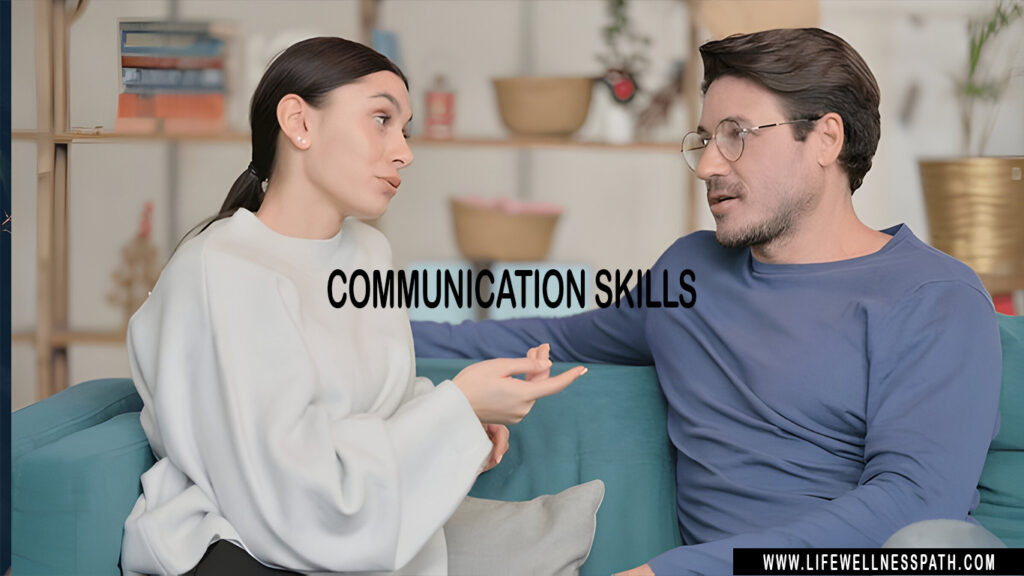Table of Contents
Introduction: The Power of Communication
Communication Skills are the backbone of human interplay. Whether you are conducting a informal chat with friends, offering at a board meeting, or negotiating a deal, your potential to talk successfully determines the final results. But what exactly makes conversation so powerful? And why do a little people seem to have a herbal gift for it even as others warfare?
In this manual, we’ll embark on a adventure to explore the depths of communique capabilities. We’ll find techniques, techniques, and suggestions that will no longer simply enhance the manner you speak but will even assist you build stronger relationships, influence others, and achieve numerous elements of lifestyles. So, are you ready to grasp the artwork of communication? Let’s dive in!

What Are Communication Skills? The Foundation of Interaction
Before we get into the nitty-gritty, let’s start with the fundamentals. Communication Skills consult with the talents you operate to carry information, specific ideas, and share your thoughts with others. These capabilities are not just about speaking; they encompass listening, observing, or even knowledge nonverbal cues.
At its middle, communique is ready connection. When you talk efficiently, you create a bridge between yourself and others, allowing for the change of ideas, feelings, and records. But why is it so crucial? Because, without strong communication capabilities, misunderstandings are inevitable. Relationships can falter, and opportunities can slip through your arms. Mastering verbal exchange is the important thing to unlocking success in every region of your lifestyles.
The Communication Process: Sending and Receiving Messages
Communication is not pretty much spoken me; it is a -manner street. The conversation method includes both sending and receiving messages. Think of it as a cycle: you ship a message, the other person gets it, methods it, after which responds. Simple, proper? Well, now not constantly.
The mission lies in ensuring that the message you intend to ship is the one it’s in reality received. This is wherein many of us falter. We might say something with one that means; however, the different individual translates it differently. To navigate this, it’s critical to be clear, concise, and thoughtful of your audience. And while you’re on the receiving cease? Listen actively, ask clarifying questions, and make sure you’re deciphering the message as supposed.
Why Listening Is Key to Effective Communication Skills: Hear Me Out
It’s clean to count on that conversation is all approximately talking. However, one of the maximum underrated communique skills is listening. Effective communique is not possible without it. Listening isn’t pretty much listening to phrases; it’s approximately information the message in the back of them.
Active listening calls for you to be completely gift inside the conversation, absorbing now not simply the phrases, however additionally the tone, emotion, and cause in the back of them. When you concentrate actively, you display the other character which you cost what they have got to mention. These fosters consider, encourages open talk, and leads to extra meaningful interactions. So, subsequent time you’re in a communication, try to pay attention more than you speak—you will be amazed at what you can learn.
Techniques for Active Listening: Tune in and Connect
Now that we’ve got installed the significance of listening, permits communicate about a way to do it efficaciously. Active listening is a talent that takes exercise, but as soon as mastered, it is able to transform your Communication Skills.
Start by using focusing entirely on the speaker. This manner placing away distractions—no telephones, no multitasking. Maintain eye contact to show which you’re engaged. Nod sometimes and use small verbal affirmations like “I see,” or “Go on,” to inspire the speaker to keep.
Another key technique is reflecting. This entails summarizing what the speaker has said to make sure you’ve understood effectively. For example, “So what you are announcing is…” This now not most effective clarifies the message but additionally shows the speaker that you’re paying attention.
The Art of Clear and Concise Speech: Say What You Mean
We’ve all been in situations where a conversation goes off beam, leaving us confused or frustrated. This often takes place while the speaker is unclear or overly verbose. The capability to express your mind clearly and concisely is one of the maximum important Communication Skills competencies you can develop.
To acquire clarity, begin via organizing your mind before you talk. What is the primary factor you want to carry? Stick to that point and keep away from useless info that would dilute your message. Simplicity is fundamental—use honest language and avoid jargon unless you are positive the listener will apprehend it. Remember, the aim is not to affect but to communicate efficaciously.
Using Tone and Pitch in Communication Skills: It’s Not What You Say, But How You Say It
Have you ever observed how the equal sentence can have a completely distinct which means depending at the tone and pitch used? That’s due to the fact tone and pitch are powerful tools in verbal exchange. They bring emotion, motive, and can even change the which means of your words.
For instance, pronouncing “I’m exceptional” with a cheerful tone communicates something totally distinctive than saying it with a flat, monotone voice. Being aware of your tone and pitch facilitates you convey your message greater appropriately. It additionally lets in you to select up on the emotions of others, making your conversation greater empathetic and effective.
Understanding Body Language: Speaking Without Words
When it comes to verbal exchange talents, nonverbal verbal exchange frequently speaks louder than words. Body language—including gestures, posture, and facial expressions—can deliver a wealth of facts that enhances or maybe contradicts your spoken words.
For instance, crossed hands would possibly indicate defensiveness, whilst leaning forward indicates hobby and engagement. A smile can position others at ease, while a frown might sign displeasure. Being aware of your very own body language and reading others’ cues can significantly beautify your communique. It’s not pretty much what you assert, but the way you present yourself while you say it.
The Role of Eye Contact: Connecting Visually
Eye contact is a fundamental a part of nonverbal conversation. It could make the difference between coming across as assured and honest or as disinterested and evasive. Maintaining eye touch at some stage in a Communication Skills indicates which you’re engaged and assured in what you are saying.
However, it is vital to strike the right stability. Too much eye contact may be perceived as competitive or intimidating, while too little could make you seem untrustworthy or disinterested. The secret’s to be herbal—maintain eye contact whilst talking and listening, but permit for short breaks to keep away from discomfort.
Different Communication Skills Styles: What’s Your Style?
Just as every person has a unique character, all of us have distinctive communique styles. Understanding your very own style and spotting others’ permit you to adapt your approach for more powerful interactions.
The 4 principal communication styles are passive, aggressive, passive-aggressive, and assertive. Passive communicators often avoid expressing their emotions or wishes, main to misunderstandings. Aggressive communicators, alternatively, explicit themselves forcefully, which could stumble upon as confrontational. Passive-competitive communicators may additionally appear passive on the floor but explicit anger or frustration not directly. Assertive communicators strike a balance—they express their thoughts and emotions virtually and respectfully, making them the most effective communicators.
Adapting to Different Communication Styles: Flexibility is Key
Once you understand the different conversation styles, the next step is getting to know a way to adapt. Effective conversation frequently requires you to regulate your fashion to better connect with others.
For example, in case you’re handling a passive communicator, you would possibly want to inspire them to explicit their mind extra brazenly. With an aggressive communicator, you may need to stay calm and assertive, placing clear boundaries. Adapting your communique fashion suggests recognize for others and can lead to extra effective and fantastic interactions.
The Connection Between Emotional Intelligence and Communication Skills: A Perfect Match
Emotional intelligence (EI) is the capacity to understand, recognize, and control your very own emotions, as well as the emotions of others. High emotional intelligence is a cornerstone of powerful verbal exchange because it lets in you to navigate social complexities and foster effective interactions.
When you’re emotionally wise, you’re better geared up to manage your reactions and reply to others in a way that is considerate and considerate. You can sense while someone is upset, satisfied, or harassed, and tailor your verbal exchange thus. This now not most effective enables you build more potent relationships however additionally makes you an extra empathetic and effective communicator.

Developing Emotional Intelligence: Building Your EI Muscles
The properly information is that emotional intelligence may be evolved. Just like some other talent, it calls for practice and self-consciousness. Start with the aid of paying attention to your feelings and the way they influence your conduct. Notice the way you react in different conditions and recall how your emotions might be affecting your communique.
Another way to develop EI is via practicing empathy. Put yourself in others’ footwear and try to recognize their emotions and perspectives. This will help you respond more successfully and strengthen your relationships. Finally, work on dealing with your emotions—particularly in annoying conditions. Staying calm and composed lets in you to communicate extra simply and efficaciously, even if the stakes are high.
Identifying Common Communication Barriers: What’s Getting inside the Way?
Even with the high-quality intentions, conversation can still hit roadblocks. Common conversation limitations frequently stand up, and recognizing them is the first step to overcoming them. Physical boundaries, like noise or distance, can impede the message you are trying to ship. Emotional barriers, which includes strain or private biases, can cloud your Communication Skills and make it difficult to hook up with others. Cultural boundaries, along with differences in language or social norms, can create misunderstandings.
Understanding those barriers facilitates you address them extra correctly. For instance, if noise is a problem, find quieter surroundings for vital conversations. If stress is affecting your potential to speak, take a second to calm down before undertaking a talk. By figuring out and addressing these boundaries, you could improve the clarity and effectiveness of your communique.
Strategies for Overcoming Barriers: Breaking Down Walls
Once you’ve diagnosed the communique obstacles, it’s time to increase techniques to overcome them. Start with physical boundaries—select quiet areas for conversations or use era to bridge gaps when important. For emotional obstacles, practice self-focus and strain control strategies. This might consist of mindfulness, deep respiratory, or taking breaks when needed.
Cultural boundaries require training and openness. Take the time to learn about distinct cultures and be respectful in their customs and conversation styles. If you are unsure about something, ask questions in a deferential manner. These techniques can assist bridge gaps and beautify your Communication Skills with others.
The Role of Rapport in Communication: Building Bridges
Building rapport is important for growing fantastic and effective conversation surroundings. Rapport entails developing a sense of connection and mutual knowledge with others. This connection could make interactions smoother and extra effective.
To construct rapport, start by means of locating not unusual ground. Share relevant non-public studies or pursuits and display actual curiosity approximately the opposite man or woman. Use open frame language, maintain eye contact, and replicate their tone and fashion of communique. These efforts can assist build a stronger, more nice dating and facilitate higher conversation.
Techniques for Building Trust: Establishing Credibility
Trust is a cornerstone of effective conversation. Building agrees with entails being steady, dependable, and transparent in your interactions. When you demonstrate honesty and observe through for your commitments, you establish credibility and foster consider.
Show empathy and information for your communications. Acknowledge others’ views and reply thoughtfully. Building consider takes time, but it’s critical for developing sturdy, fine relationships. Trust enhances your capability to speak efficaciously and achieve mutual expertise.
Giving Constructive Feedback: The Art of Effective Criticism
Constructive feedback is a vital part of effective Communication Skills. It allows people improve via providing particular, actionable pointers. However, giving comments requires a considerate technique to make sure its miles obtained definitely.
Focus at the behavior, now not the man or woman. Provide clear examples and provide suggestions for development. Deliver feedback respectfully and supportively, aiming to help instead of criticize. This approach fosters boom and keeps a fine dating, making feedback a powerful device for improvement.
Receiving Feedback Graciously: Embracing Opportunities for Growth
Just as giving comments is essential, so is receiving it. Receiving feedback graciously involves retaining an open thought and a nice attitude. Avoid taking remarks for my part and rather, view it as an possibility for growth.
Ask clarifying questions if you want more information and reflect at the remarks you acquire. Use it to make improvements and show appreciation for the enter. Embracing remarks with a constructive attitude helps you develop and enhances your verbal exchange competencies.
The Impact of Technology on Communication Skills: Navigating the Digital Landscape
Technology has revolutionized communique, imparting new equipment and systems for interplay. While these virtual advancements carry comfort, in addition they introduce specific challenges. Digital verbal exchange often lacks the nuance and immediacy of face-to-face conversations, leading to potential misunderstandings.
Balance virtual verbal exchange with in-person interactions to keep sturdy relationships. Ensure your digital messages are clear and respectful, and use era as a supplement to, rather than a substitute for, private verbal exchange. This method facilitates you navigate the digital landscape correctly.
Balancing Digital and Face-to-Face Communication: Finding the Right Mix
Finding the proper stability between digital and face-to-face conversation is essential. Digital equipment is beneficial for brief updates and routine interactions, but face-to-face meetings are essential for more significant conversations and dating-building.
Prioritize in-person meetings for essential discussions, brainstorming, and fostering deeper connections. Use virtual verbal exchange for performance and convenience, but make certain it doesn’t replace the personal touch of face-to-face interactions. This stability enhances your universal communication effectiveness.
Effective Communication inside the Workplace: Enhancing Professional Interactions
In the professional realm, powerful communication is prime to fulfillment. It involves clear exchanges of facts, collaboration, and preserving a high-quality work surroundings. Encourage open speak, be approachable, and exercise lively listening.
Share information transparently and are searching for enter from colleagues. Address conflicts right away and respectfully. Strong place of business verbal exchange fosters teamwork, boosts productiveness, and contributes to a nice organizational way of life.
Public Speaking and Presentations: Commanding the Stage
Public talking can be a frightening assignment, however with the right approach, it becomes a energy. Effective public talking entails greater than handing over a speech—it’s approximately enticing your target audience and creating a memorable effect.
Prepare thoroughly by way of information your material and training your transport. Use visible aids effectively and engage your target audience with interactive factors. Building self-belief and refining your presentation abilities will help you talk your message absolutely and depart a long-lasting influence.
Improving Communication with Loved Ones: Strengthening Personal Relationships
Improving communication with cherished ones is vital for maintaining healthful relationships. Open, honest speak fosters know-how and connection. Set apart time for meaningful conversations and pay attention actively for your partner, circle of relative’s contributors, or friends.
Express your mind and feelings openly and cope with any troubles with empathy and recognize. Strong communique with cherished ones builds consider and strengthens your relationships, growing a supportive and pleasant environment.
Continuous Improvement in Communication Skills: Lifelong Growth
Continuous improvement in communication skills involves normal exercise, self-mirrored image, and a willingness to examine. Seek feedback, attend workshops, and read books on conversation to refine your abilities.
Set non-public dreams for reinforcing precise components of your communique. Practice new strategies and strategies to your everyday interactions. Remember, studying communication skills is an ongoing journey, and the more you put money into it, the extra rewarding the consequences.
Taking the First Step: Start Practicing Today
Now that you’ve explored our comprehensive manual on verbal exchange abilities, it’s time to place your newfound know-how into motion. Start training the recommendations and techniques mentioned to your day-by-day interactions. Focus on energetic listening, clear speech, emotional intelligence, and overcoming boundaries.
Effective verbal exchange is an effective tool that may remodel your personal and professional existence. Embrace the challenge, apply what you’ve learned, and watch how your conversation capabilities beautify your interactions and possibilities. Happy communicating!
Read More: 10 Powerful Ways to Enhance Eroticism and Intimacy in Your Relationship
FAQS About Communication Skills:
- What are five top verbal exchange abilities?
- Answer: Effective verbal exchange capabilities encompass active listening, clean articulation, empathy, confidence, and the ability to examine nonverbal cues.
- What are 7 right communique abilities?
- Answer: Key communique skills are lively listening, readability, empathy, self-assurance, nonverbal verbal exchange, comments, and flexibility.
- How do you describe proper verbal exchange capabilities?
- Answer: Good verbal exchange abilities contain the capacity to carry facts simply and efficaciously, concentrate actively, and have interaction with others in a manner that fosters mutual information.
- What are the three crucial skills of conversation?
- Answer: The three critical Communication Skills competencies are active listening, clean expression, and empathy.
- What is energetic listening in conversation abilities?
- Answer: Active listening is completely concentrating, expertise, responding, and remembering what the opposite man or woman is announcing. It entails giving complete interest to the speaker and acknowledging their message.
- Why is clarity essential in conversation talents?
- Answer: Clarity ensures that your message is thought as meant. It facilitates keep away from misunderstandings and guarantees that the statistics is conveyed appropriately.
- How can I enhance my nonverbal conversation skills?
- Answer: Improve nonverbal conversation abilities by means of being aware about your frame language, keeping eye contact, the usage of suitable facial expressions, and ensuring your gestures suit your words.
- What is empathy in verbal exchange abilities?
- Answer: Empathy includes know-how and sharing the feelings of others. It allows build accept as true with and rapport by way of displaying which you care approximately the alternative man or woman’s angle and emotions.
- How can comments decorate Communication Skills abilities?
- Answer: Feedback affords insights into how your message was received and how you may improve. It allows clarify misunderstandings and improve communique abilities.
- What position does self-assurance play in effective Communication Skills competencies?
- Answer: Confidence helps you gift your ideas assertively and absolutely. It builds credibility and makes your message more convincing.
- How do you practice energetic paying attention to enhance verbal exchange competencies?
- Answer: Practice lively listening by means of focusing at the speaker, heading off interruptions, asking clarifying questions, and summarizing what you’ve heard to ensure understanding.
- What are a few obstacles to effective conversation capabilities?
- Answer: Common barriers encompass bodily noise, emotional strain, cultural differences, and language misunderstandings.
- How can I conquer communique barriers to enhance my abilities?
- Answer: Overcome obstacles by being privy to them, adapting your verbal exchange skills style, and the usage of techniques which includes energetic listening and clarification.
- Why is it important to apprehend nonverbal verbal exchange abilities?
- Answer: Understanding nonverbal conversation skills facilitates you interpret others’ emotions and reactions, ensuring your message is received as meant and enhancing basic interplay.
- How can I construct rapport with others the usage of Communication Skills abilities?
- Answer: Build rapport by way of locating commonplace interests, being genuine, displaying recognize, and attractive in lively listening.
- What are some examples of effective communique competencies strategies?
- Answer: Effective techniques encompass the use of “I” statements, being concise, the use of advantageous frame language, and providing positive feedback.
- How does cultural cognizance effect Communication Skills abilities?
- Answer: Cultural recognition allows you navigate variations in conversation competencies and keep away from misunderstandings by means of showing appreciate for diverse perspectives.
- What is the significance of comments in growing verbal exchange abilities?
- Answer: Feedback is vital for improving Communication Skills competencies by providing insights into how your message became acquired and figuring out areas for enhancement.
- How can I beautify my readability in Communication Skills talents?
- Answer: Improve clarity through organizing your mind earlier than speaking, the use of easy language, and checking for know-how.
- What are some not unusual communique skills mistakes to avoid?
- Answer: Common errors encompass interrupting, being indistinct, failing to listen, and ignoring nonverbal alerts.
- How can I efficiently speak in a crew placing to beautify my talents?
- Answer: Communicate efficiently in a group by way of being clear and concise, listening actively, providing optimistic remarks, and fostering inclusive surroundings.
- What are the advantages of sturdy communique competencies?
- Answer: Strong verbal exchange skills cause better relationships, increased productivity, fewer misunderstandings, and extra effective trouble-solving.
- How can I develop higher listening talents as a part of my conversation abilities?
- Answer: Develop better listening skills with the aid of working towards energetic listening, minimizing distractions, and showing proper interest within the speaker.
- What is the function of body language in communication skills?
- Answer: Body language conveys emotions and reinforces your spoken message. It allows others apprehend your emotions and intentions.
- How can I take care of conflicts thru verbal exchange capabilities?
- Answer: Handle conflicts by using staying calm, taking note of all perspectives, expressing your perspectives in reality, and working in the direction of a mutually agreeable answer.
- What are a few guidelines for effective public talking as part of verbal exchange abilities?
- Answer: Tips encompass knowing your target market, training your speech, the use of visible aids, and attractive with the target audience via eye touch and interactive elements.
- How can I enhance my written conversation competencies?
- Answer: Improve written conversation capabilities with the aid of organizing your content sincerely, the use of proper grammar and punctuation, and proofreading your paintings before sending it.
- What is the effect of era on communique competencies?
- Answer: Technology affects conversation abilities by supplying new equipment for interaction however additionally growing challenges like reduced face-to-face contact and capability misinterpretations.
- How can I preserve effective communique capabilities in remote groups?
- Answer: Maintain effective verbal exchange capabilities in remote groups with the aid of the usage of dependable communique tools, scheduling regular check-ins, and ensuring readability to your messages.
- What are a few strategies for improving interpersonal conversation abilities?
- Answer: Strategies encompass practicing energetic listening, being conscious of nonverbal cues, displaying empathy, and adapting your verbal exchange capabilities style to fit extraordinary people.







